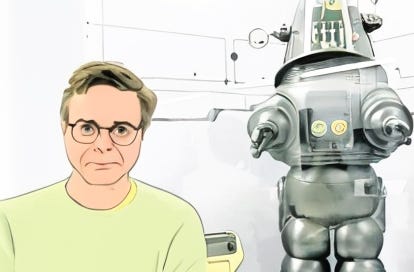I’ve been thinking
Not always a great idea, but anyway. I’ve been thinking that this is a really terrible time for me to be focusing on writing for a living, especially copywriting. In the last few months (and it seems longer, doesn't it?), we’ve seen AI go from the periphery to the middle of a lot of discourse on modern life. One of the aspects of the debate, inevitably, is around AI’s possible impact on jobs. In particular, on white-collar jobs.
This all happened in the few months after I left my day job and decided to write for a living. Great timing, eh?
Oh the irony, the irony
A particularly poignant irony here is that in my previous work, I sometimes used to give talks (at graduation ceremonies, at opening ceremonies, basically to anyone who’d have me) which, with tongue resolutely in cheek, I’d call “The Robots are Coming”. I liked to impress my audience with the fact that I’d read a few articles on automation and jobs, share a few stats plus one or two learning points from history (“the Luddites got it wrong!”), before declaring, with great insouciance, that the last two hundred and fifty years had taught us that new technology tended to create more jobs overall. We were all safe!
Now, a proud possessor of qualifications and experience in copywriting, teaching languages and translation, I see that AI is coming for my lunch.
So, having enjoyed teasing a group of graduating medics about the possible demise of human radiologists, I’m the one left wondering how to pick up the stray grains left in the wake of the great threshing machines they call LLMs. I’ll need to diversify my skills portfolio. Luckily, growing up on a farm, I did learn a few things about animal husbandry. I bet AI hasn’t yet cracked how to muck out pigs.
“The value of the chat interface for finding and recomposing text isn’t the time it saves you or the work it automates. It’s the thinking you must do to get it to give you your desired response.”
Ian Carlos Campbell
It could be worse
Anyway, I’m lucky enough to have a steady amount of work copywriting at the moment, as not everyone yet trusts the machines. And there is still hope for translators, it seems, even if AI systems have turned out to be excellent translators (which, apparently, they weren’t designed to be).
More importantly, for present purposes, I’d never dream of letting it loose on my writing here.
My own experience has been that the machines are very good for research, for summarising and for suggesting alternative phrasing.
In some cases where attributes such as tone or "personality" don't matter, maybe the job is theirs (as long as someone needs to check their facts - they’re still “hallucinating”).
What current AI systems struggle with, though, is tone of voice. They can approximate, but they can't nail it. I think the discursive or lyric essay is (relatively) safe from them for now. And Substack is the best place to find humans producing wonderful essays!
Finally
What I actually find useful about AI software is the process of "chatting" with it to help clarify my thinking about a project. And although, at four months old, it’s almost ancient history in terms of the development of AI this year, I think this quote from Ian Carlos Campbell is one of the best takeaways: “The value of the chat interface for finding and recomposing text isn’t the time it saves you or the work it automates. It’s the thinking you must do to get it to give you your desired response.”
Amen, after all, to thinking.





